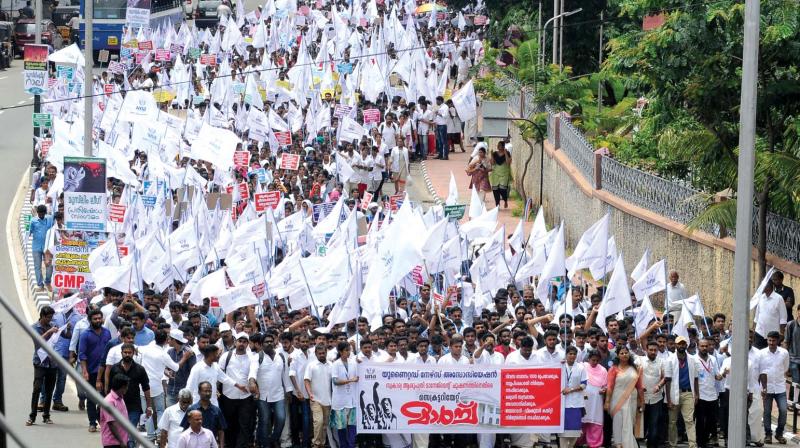Nurses driven to the wall
Nurses who are up in arms against failure to revise their pay scale which was due in 2016, say they have no other option but to strike.

THIRUVANANTHAPURAM: The private health care sector in the state is on the boil following the ongoing protest of nurses under the banner of United Nurses Association who are demanding higher wages. Nearly 80,000 to 1 lakh nurses working in 326 private hospitals across the state have threatened to strike work indefinitely from July 17. The nurses who are up in arms against the failure to revise their pay scale which was due in 2016, say they have no other option but to strike. If the nurses go ahead with the strike, it would cripple the private health sector which accounts for 70 per cent of health care services in the state. In a bid to resolve the issue the private hospital Industrial Relations Committee reached an agreement to revise wages for the nurses of private hospitals two days ago, but the UNA rejected their proposal.
IRC decided that the wages for nurses in hospitals with more than 800 beds would be hiked to Rs 23,760. The government claimed that the new agreement would ensure a minimum hike of 50%. The IRC is scheduled to meet again on July 20 to submit recommendations to the Minimum Wages Advisory Board. According to plan, the Board will issue a draft notification and after receiving complaints from the stake holders, would finalise the wage structure. However, UNA has said no to the proposed wage structure. As per the proposal, a B.Sc nurse working in a hospital with 50 beds would be entitled to a pay scale of Rs 18,232. The revised pay of Rs 23,760 would be applicable only in hospitals having more than 800 beds which mean it will benefit staff in three to four hospitals.
It alleged that even these hospitals were planning to reduce the bed strength to circumvent the IRC decision. On the whole less than 100 nurses would benefit from the pay hike. “The government proposal is totally unacceptable to us. Let them implement Supreme Court directive on nurses wage structure,” demanded UNA state president Jasminsha. According to him, the wages in hospitals which have more than 200 bed strength should be on par with government pay scale which is Rs 27,800 basic pay. Between 100-200 bed strength - Rs 25,800 and less than 50 beds the minimum wages should be Rs 20,000 which includes nurses enrolled as trainees. The association has demanded the scrapping of the highly exploitative trainee system in hospitals.
“We are firm on going ahead with our indefinite strike from July 17 if the government fails to accept our demands,” said UNA president. The association has extended all support to the government to maintain health care services in the wake of increasing fever cases. “Our members are ready to offer free services in government hospitals and also in other institutions if special wards are set up. We are committed to people. We have no other option but to strike since the government has been hoodwinking us for the past one and a half years, “he said.
The association lamented that those enrolled as trainees were being paid just Rs 6000. The government and managements were not even bothered to frame concrete guidelines for their service and wage protection. Nurses also received support from Veteran leader V S Achuthanandan. "While the ordinary workers were getting Rs 800 to Rs 1000, many hospitals are paying just Rs 350 to nurses. This when the private hospitals are charging Rs 500 to Rs 3000 per day as nursing care charges," he remarked recently.
However, the private hospital managements allege that the UNA and INA had walked out of the Industrial Relations Committee (IRC) instead of discussing the wage structure. They have resorted to unilateral protest without believing in the rule of law and the grievance redressal mechanism. The strike is aimed at blackmailing the management and government. Hearing is going on and if they have any divergent views on the award, then they can put forward their suggestions before the panel.
Dr R. V. Asokan, chairman, Hospital Board of India, said raising the wages of the nursing staff would have direct bearing on the salaries of non medical staff like receptionists, office staff, cleaning staff and watchman. “The salaries of these categories will have to be increased proportionally. Such a hike is likely to cripple small and medium hospitals which are already on the brink. Over 800 hospitals have disappeared in the state during the past two decades because of viability issues. The number has come down from 1900 to 1100 as per the registration details with IMA and hospitals linked with the bio medical waste management programme of IMA,” he said.
The government statistics in 2006 had itself shown that the number of hospitals had come down by 500. Experts say while small and medium hospitals were disappearing, the larger ones – the corporate types - are filling their space and pushing up the health care cost significantly. Moreover, government concessions are given only to hospital less than 20 beds which are only few and far between in the state. With the private sector being the major health care provider in the state, the government, private hospitals and nurses associations will have to sit across the table to resolve the issue and avert a major crisis.

